Good marketing is always about the customers, period. That’s the most important lesson I’ve learned from all my wins and losses as a marketer.

To launch successful marketing campaigns, you must know every detail about your audience — their goals, aspirations, pain points, and more. And building buyer personas is a good place to start.
Download Our Free Buyer Persona Guide + Templates
I brainstormed with the team and curated 40 buyer persona interview questions to survey your audience and create accurate personas.
Once you have the data, use our free buyer persona template to share your findings with the rest of your company.
Table of Contents
Why conduct buyer persona interviews?
A buyer persona (or user persona) is a fictionalized representation of your target customer. It essentially gives you an overview of your buyers’ preferences, pain points, motivations, and more.
But even though buyer personas are fictional, you need real-life data to base each persona on. It has to represent your actual customers’ needs and aspirations accurately. That’s where buyer persona interviews and surveys will help you collect data to design these personas.
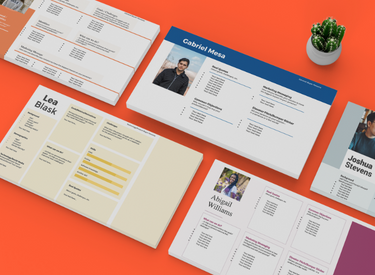
Buyer Persona Templates
Organize your audience segments and make your marketing stronger.
- Learn about personas.
- Conduct persona research.
- Create targetted content.
- Build your own personas.
Download Free
All fields are required.

I use buyer persona surveys and questionnaires to gauge my audience's needs.
My ideal starting point is choosing a sample group from my customer base. I’ll then share the survey with these participants to comprehensively understand their goals, challenges, jobs to be done, and more.
If you lack the resources to conduct a survey, I recommend using a market research platform like Qualtrics to conduct panels and interviews with your chosen participants.
Once you’ve decided whom you’re going to survey, you can pick specific questions to collect data related to:
- Demographics such as their age, education, occupation, and income.
- Psychographics such as their habits, beliefs, behaviors, and preferences (like shopping preferences).
This information can benefit businesses and brands looking to convert leads, personalize the customer experience, and improve their bottom line.
Here’s a buyer persona example to show how it works. I created this using HubSpot’s free Make My Persona tool.
3 Key Benefits of User Persona Surveys & Interviews
Buyer personas eliminate guesswork from your marketing strategy. These personas tell you the exact problems and aspirations of your target audience.
As a result, you can make data-driven decisions and launch campaigns tailored to your customers’ preferences. I rely heavily on buyer persona surveys to get a pulse of my audience and design accurate personas.
Here are some benefits I’ve experienced from asking the right persona questions.
1. I captured more high-quality leads.
Knowing your customers’ typical challenges and needs helps create campaigns that truly appeal to them. By discovering your target audience’s habits and challenges through persona interviews, you can accurately tailor your sales and marketing campaigns to the users most likely to buy from you.
2. I personalized the customer experience.
Personalizing the customer experience is one of the best ways to stay top-of-mind for potential customers and win their business.
Customers will be more likely to buy from you if they feel like you’re speaking directly to them. You can know them better through persona interviews and recognize their concerns. As a result, it becomes easier to create personalized messaging and connect with them at a deeper level.
3. I improved my bottom line.
Buyer personas can significantly improve your bottom line by maximizing lead generation and driving conversions. These personas will also inform your strategy to deliver a positive and targeted customer experience.
The result? Higher customer retention and brand loyalty.
Pro tip: Build a laser-focused content marketing strategy to generate top-of-funnel interest in your brand. Check out the free content marketing training resources in the HubSpot Academy to build your content strategy today.
Buyer Persona Questions
- What is your educational background?
- What industry does your company operate in?
- How big is your company in terms of revenue and number of employees?
- What is your job title, and how long have you been in this position?
- How does your team or company define success for purchases like this?
- Where do you typically find information to help you make buying decisions?
- What makes you trust a brand enough to purchase from them?
- How important is it that a company aligns with your values?
- What are the biggest challenges or pain points you face in your role?
- What tools or technology do you currently use? Are there any limitations impacting your performance?
Download our free buyer persona template here to learn how to create buyer personas for your business.
Questions About Their Personal Background
Knowing your buyers’ backgrounds gives you crucial insights into their interests, upbringing, communication style, and other preferences.
In my experience, understanding personal background gives you some much-needed cultural context to positively influence your target buyers.
This is your opportunity to ask buyer persona interview questions related to their education and work experiences, demographics, and personal interests.
Here are some questions I include about buyers’ personal interests:
- What is your educational background?
- Share how your career path led you to your current role.
- Where are you located? How does that influence your work?
- What is your preferred style of communication?
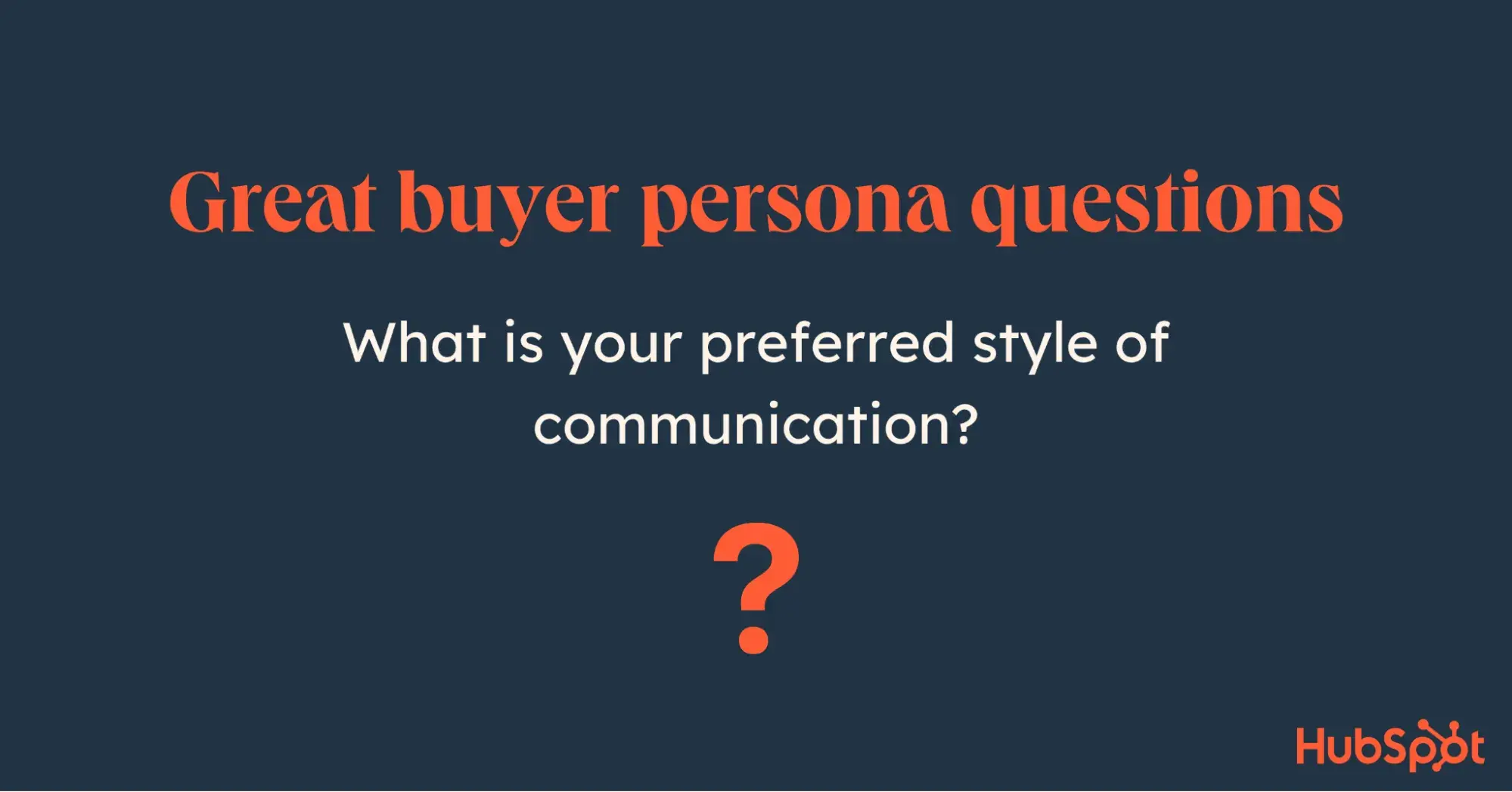
Questions About Their Company
I always collect information about the company where my target buyers work.
This can include data about the company size, business goals, and challenges faced. This data gives me specific insights to tailor my communication for each buyer based on their work environment.
Besides, when you know the necessary details about your persona's company, like the number of employees, you can quickly outline the fields for your landing page forms.
Here are some questions I include about the buyers’ company:
- What industry does your company operate in?
- How big is your company in terms of revenue and number of employees?
- What are the primary goals your company is trying to achieve this year?
- What are the major challenges your company faces in the current market?
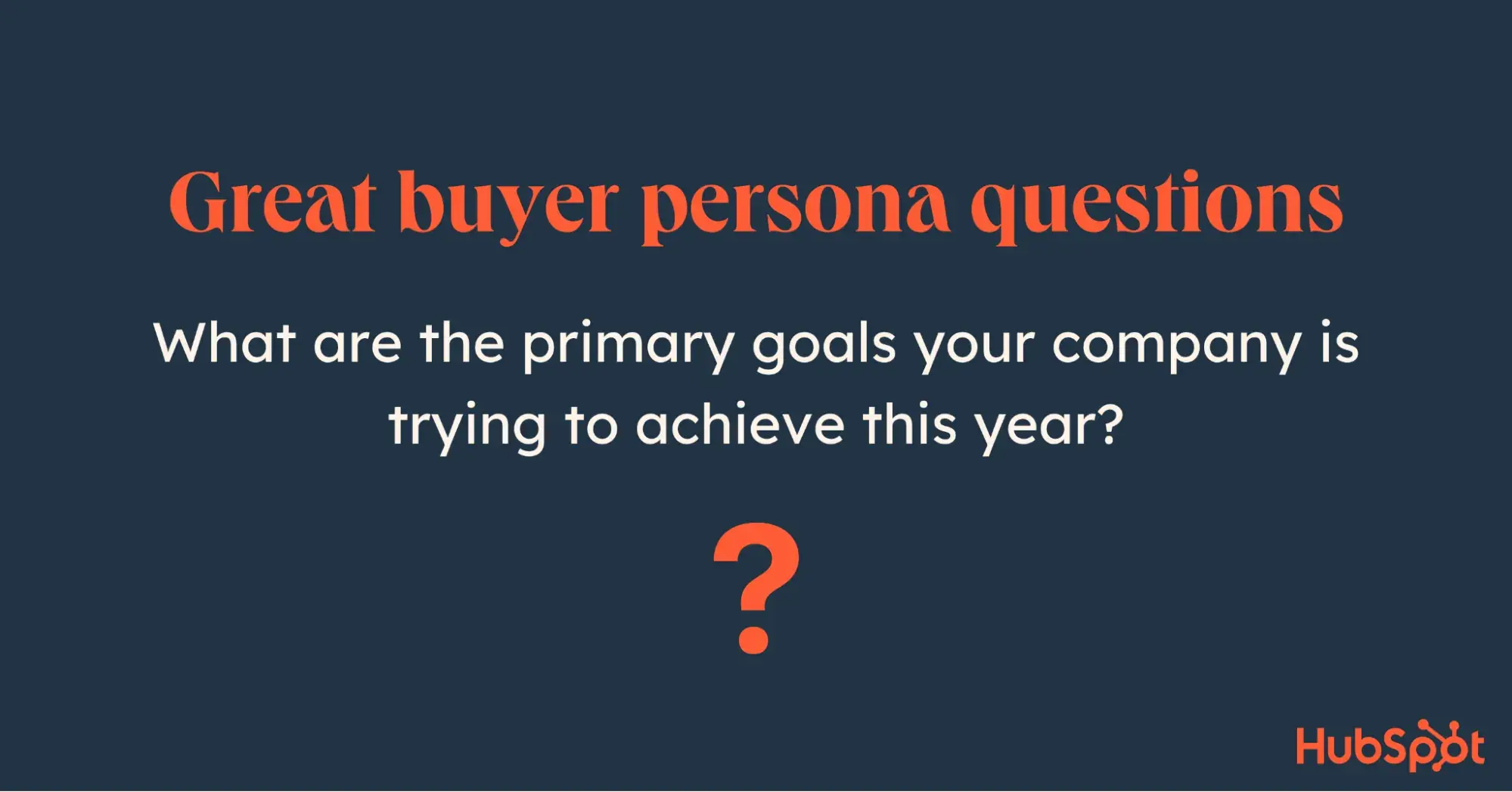
Questions About Their Role
The importance of your buyer persona‘s job depends on the product or service you’re selling.
If you‘re a B2C company, you may simply consider this information as another way to better understand the nuances of your persona’s life.
If you're a B2B company, this information becomes more crucial. Think about the many moving parts for a B2B buyer — are your personas working at a managerial or director level, and are they well-versed in the intricacies of this industry?
Experienced buyers will need less education than someone at an introductory level, who may need to loop in other decision-makers before making purchasing decisions.
Here are some questions I include about buyers’ roles:
- What is your job title, and how long have you been in this position?
- What are your primary responsibilities?
- What does a typical day look like in this role?
- What knowledge and tools do you use in your job?
- What are the biggest challenges you face in your day-to-day work?
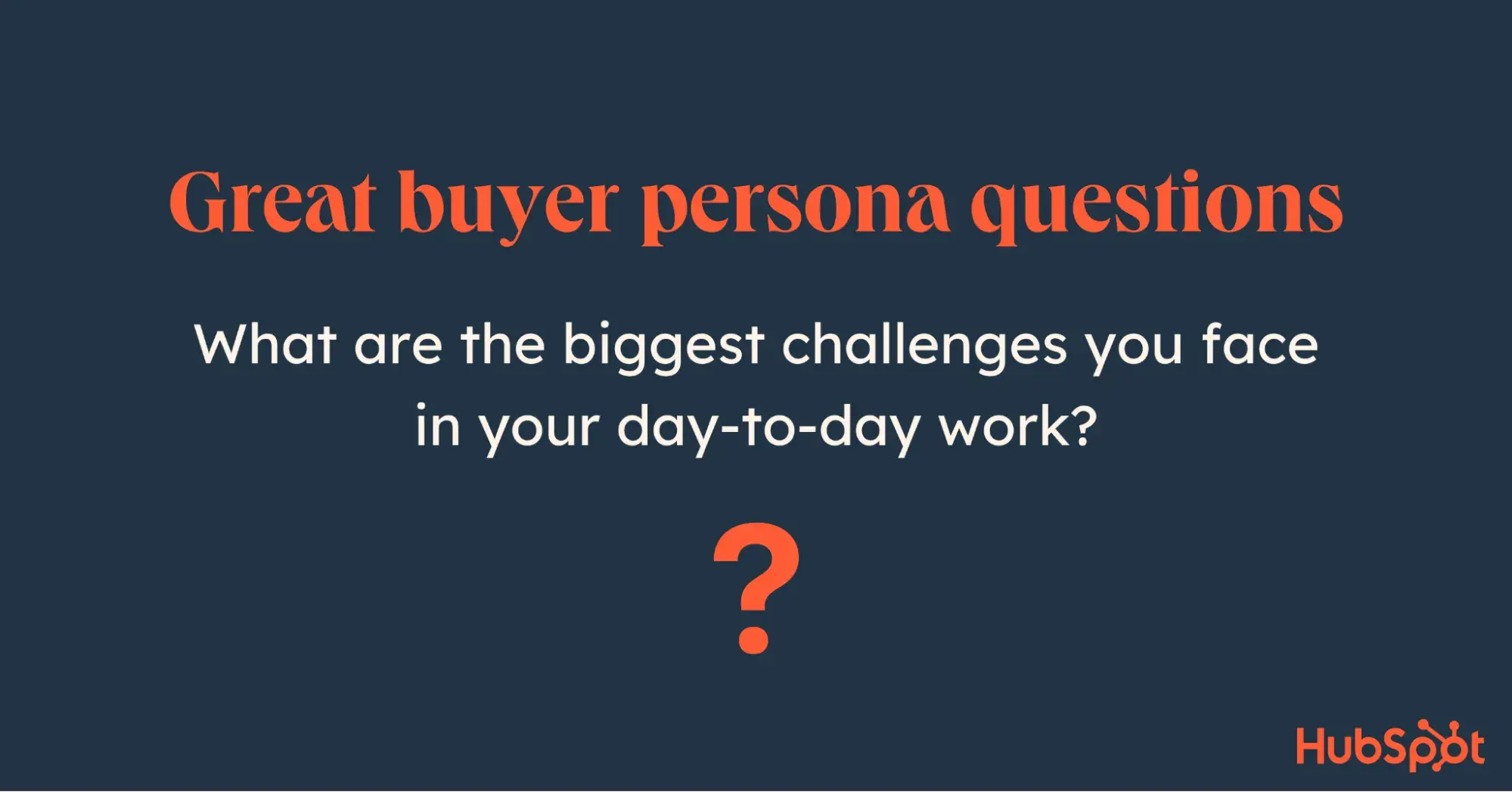
Pro tip: Try to make these persona interview questions as close-ended as possible. This will bring more objectivity in your buyer personas, and you can quote specific data points about each persona’s role.

Buyer Persona Templates
Organize your audience segments and make your marketing stronger.
- Learn about personas.
- Conduct persona research.
- Create targetted content.
- Build your own personas.
Download Free
All fields are required.

Questions About Buyer Goals
Identifying buyers’ goals and motivations is important to define specific outcomes for your messaging. I use this data to identify the key benefits to emphasize for each type of buyer.
You should know what success looks like for your buyers. Understanding their notions of success will help you position your product/service as a more relevant offering. Besides, knowing how buyers measure success will help you demonstrate the specific value they’re looking for.
Here are some questions I include about buyers’ goals:
- What are your main objectives when considering a product or service like ours?
- How does your team or company define success for purchases like this?
- What would make you a champion for the product internally?
- Are there specific KPIs you need to meet with this purchase?
- How do you measure success in your role specifically?
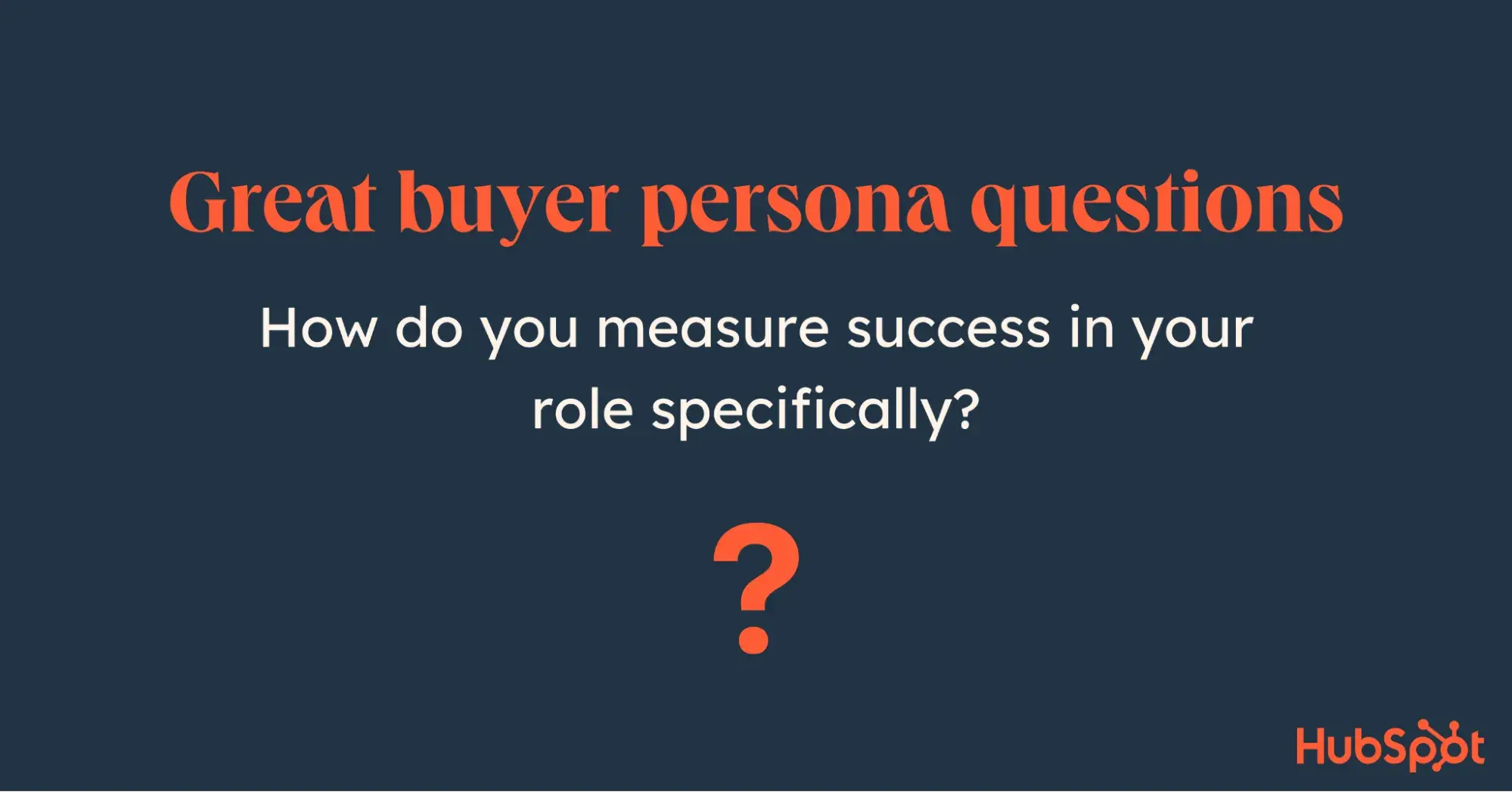
Questions About How Buyers Learn
If you're going to market and sell to these personas, you need to understand how they consume information.
I typically start by collecting information about their required upskilling at work. You can also explore their preferred learning formats, like detailed reports, blog posts, short videos, and podcasts. Ask relevant questions to identify their trusted learning sources, whether it’s industry experts or research platforms.
Your goal should be to understand their learning style entirely. Here are some questions I include about buyers’ buying journey:
- What type of content or resources do you prefer to learn more about a concept?
- Where do you typically find information to help you make buying decisions?
- What publications and thought leaders do you follow for industry insights?
- Do you attend any industry events or conferences for learning?
- Which communities and social networks do you participate in?
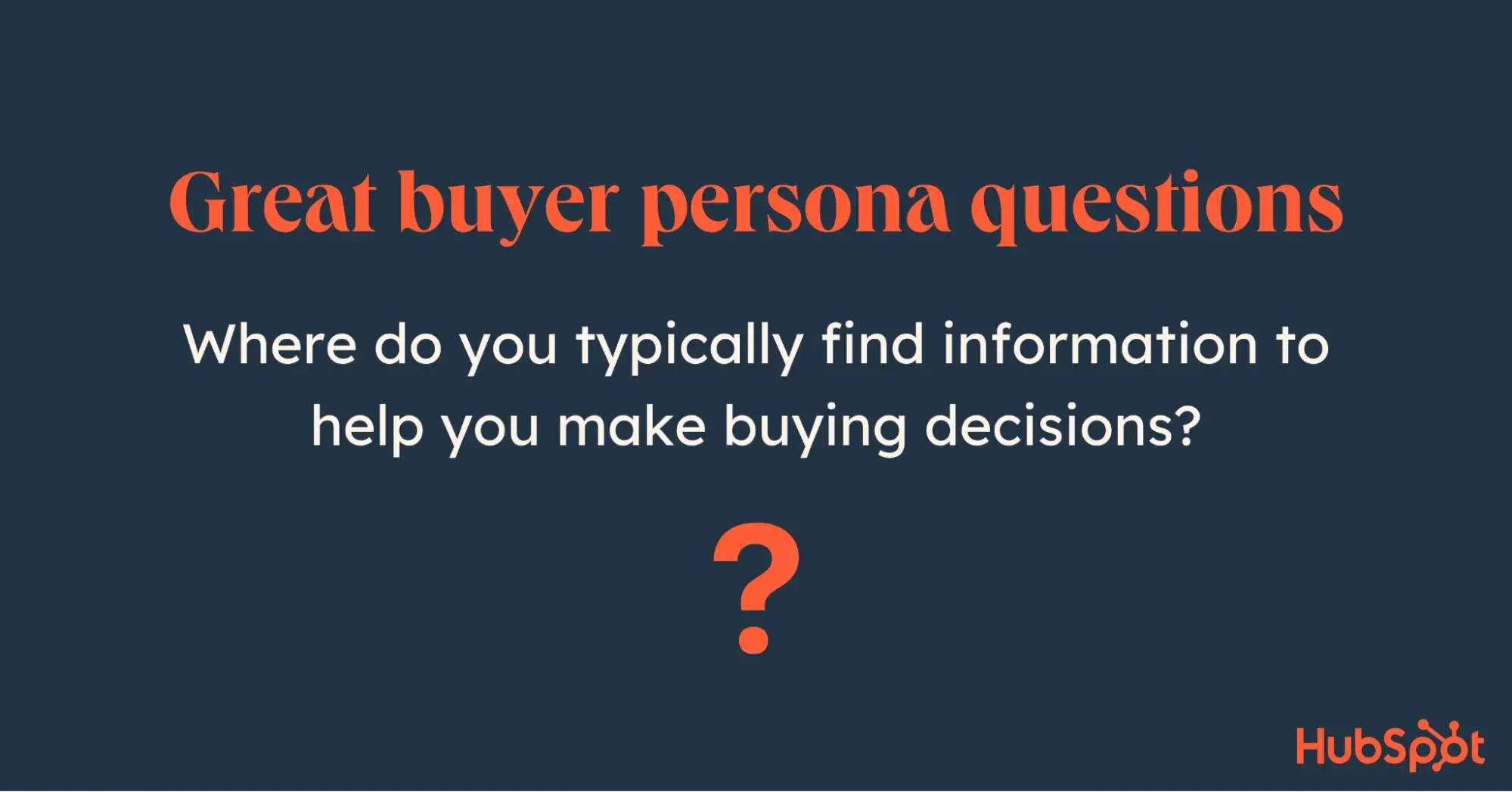
Pro tip: I recommend doing independent research to learn how your target buyers learn before framing these questions. You can identify and explore the most popular resources and communities for your buyers. This way, you can skip the obvious questions and focus on collecting more meaningful information.
Questions About Their Shopping Preferences
You should understand your buyers' evaluation process when making a purchase.
Before buying a product, you need to get a behind-the-scenes look at their analysis. Ask about the avenues they use to find information, such as online searches, review websites, network recommendations, and more.
If you can anticipate the objections your persona will have, you can be prepared for them in the sales process. You will also be able to educate them in your marketing collateral to help allay fears right away.
Here are some questions I include about buyers’ shopping preferences:
- Describe a recent purchase from start to finish.
- How do you typically find, research, and evaluate vendors or products?
- What factors are most important when making a purchase decision?
- How do you prefer to interact with potential vendors?
- What makes you trust a brand enough to purchase from them?
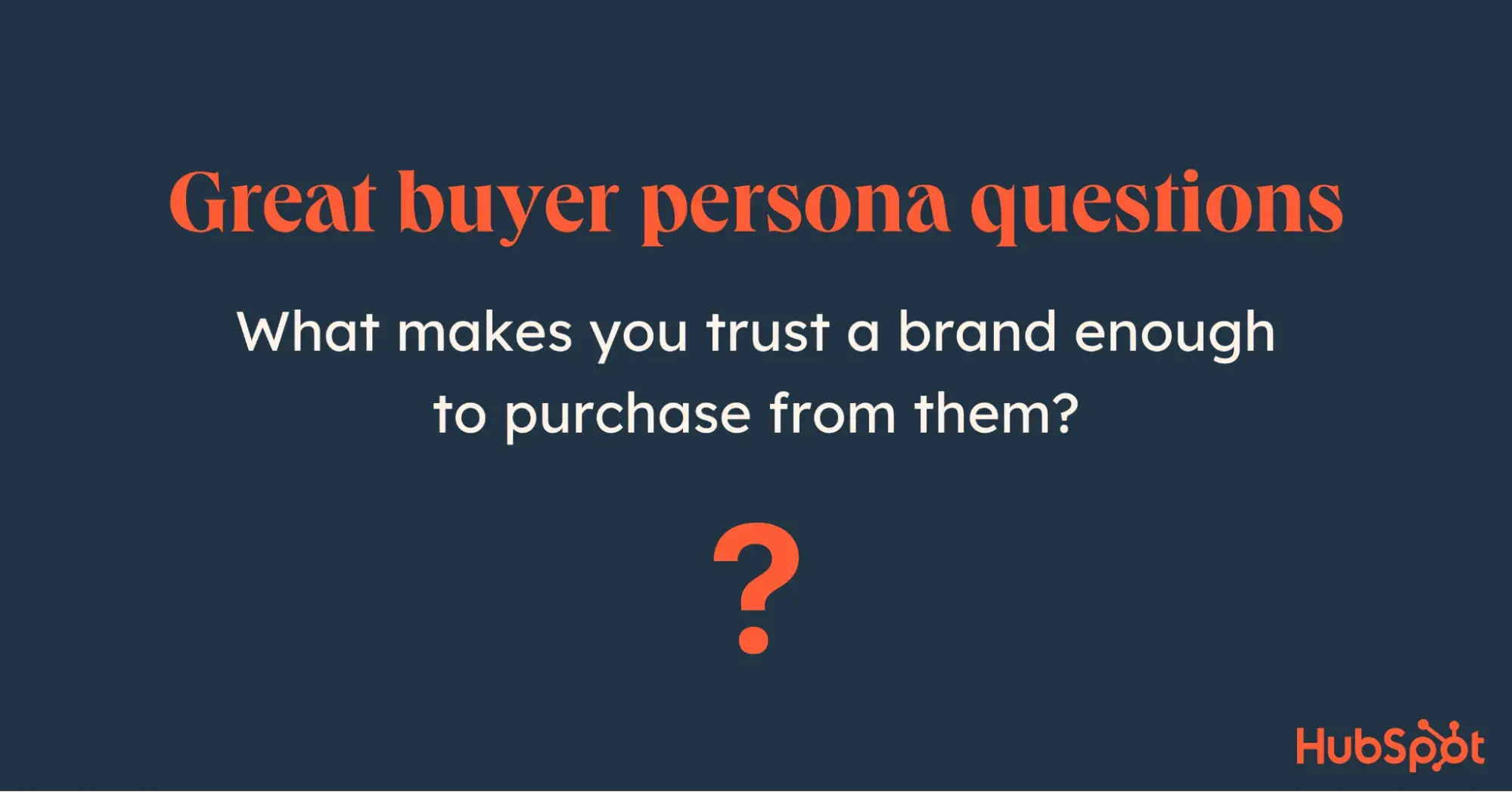
Questions About Values
Your buyers’ values are central to purchasing decisions. You can stand out among sellers by showcasing your commitment to the core values your buyers believe in. I’ve observed how this value alignment can also win buyers’ trust in the long term and build loyalty.
Here are some questions I include about buyers’ values:
- What values or ethics guide your buying decisions?
- What would make you loyal to a brand over time?
- How important is it that a company aligns with your values?
- Are there social or environmental issues that you prioritize when choosing products?
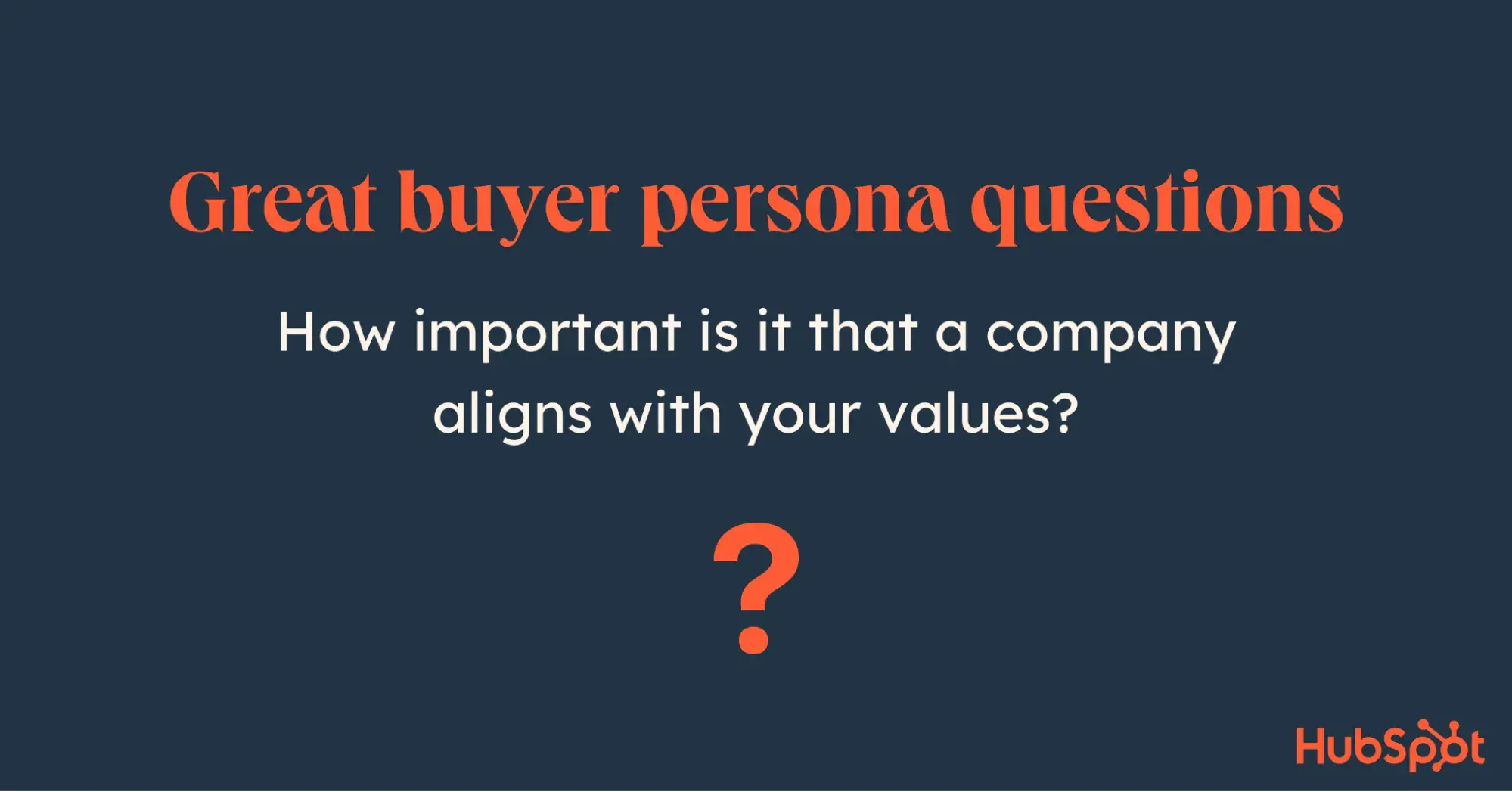
Questions About Pains and Challenges
Buyers’ pain points are a critical part of your personas. When you know their problems and challenges, you can offer specific solutions that resonate with them. It makes your pitch unique and shows you’ve done your homework.
Plus, it’s good to understand the solutions they’ve tried in the past, but they didn’t work. You can empathize with them and present your offering as a better alternative to eliminate all frustrations.
Here are some questions I include about buyers’ pain points:
- What are the biggest challenges or pain points you face in your role?
- How are these challenges affecting your ability to meet your goals?
- Have you tried solutions in the past that didn’t work? What were they lacking?
- What would solving these challenges mean for your business or role?
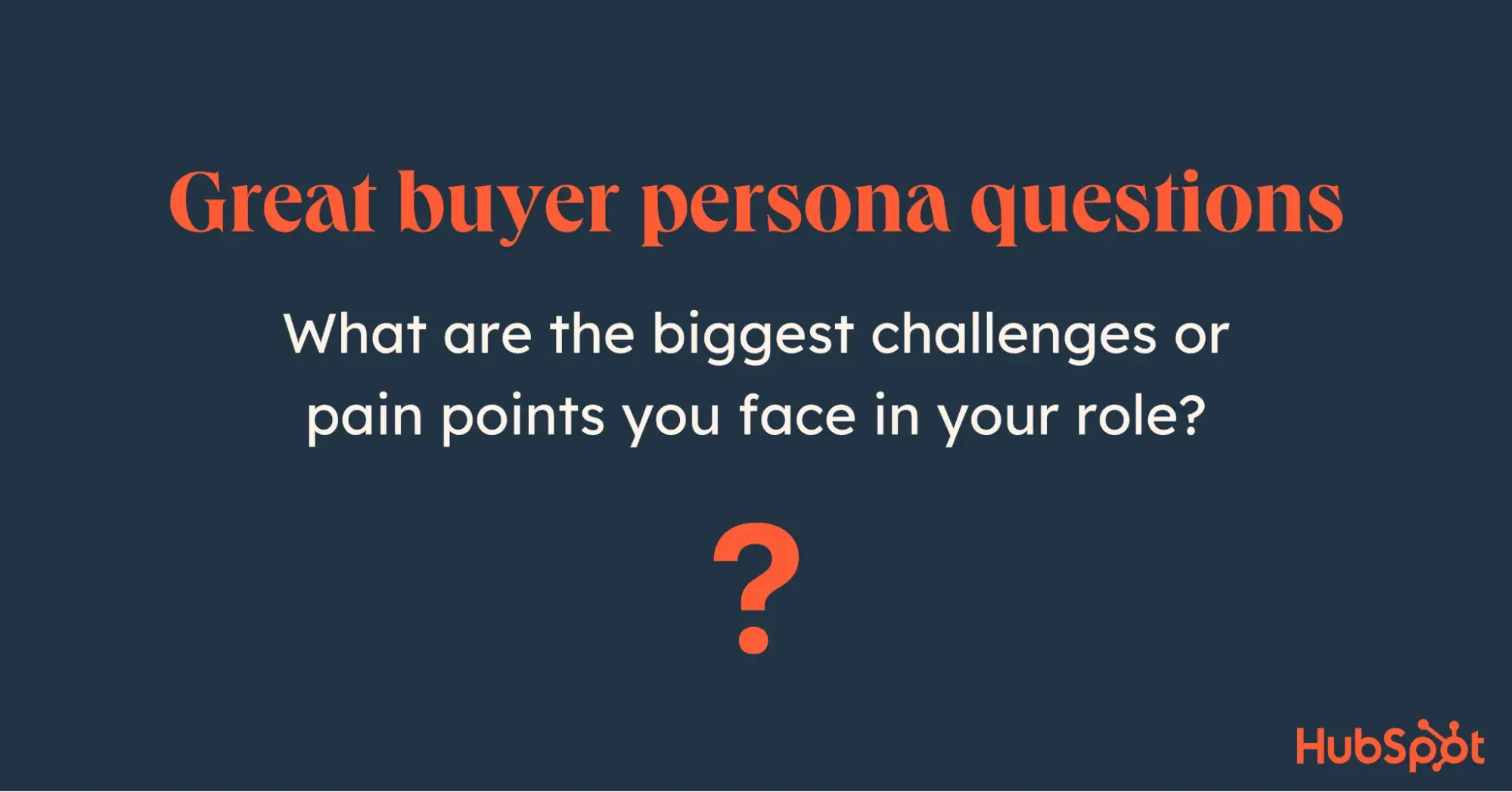
Questions About Their Environment
A buyer’s environment typically involves their work setup and the industry they operate in.
Knowing these details makes it easier to identify their priorities and fit your offering in their preferred context. For example, remote workers will focus on greater collaboration, while in-person employees may need better equipment.
I always include some of these persona interview questions to understand market trends and shifts in my buyers’ space.
Here are some questions I include about buyers’ environments:
- How does your work environment impact your buying decisions?
- How does your company adapt to shifts in the market or industry?
- Are there any market trends or external factors influencing your company’s strategy?
- What tools or technology do you currently use? Are there any limitations impacting your performance?
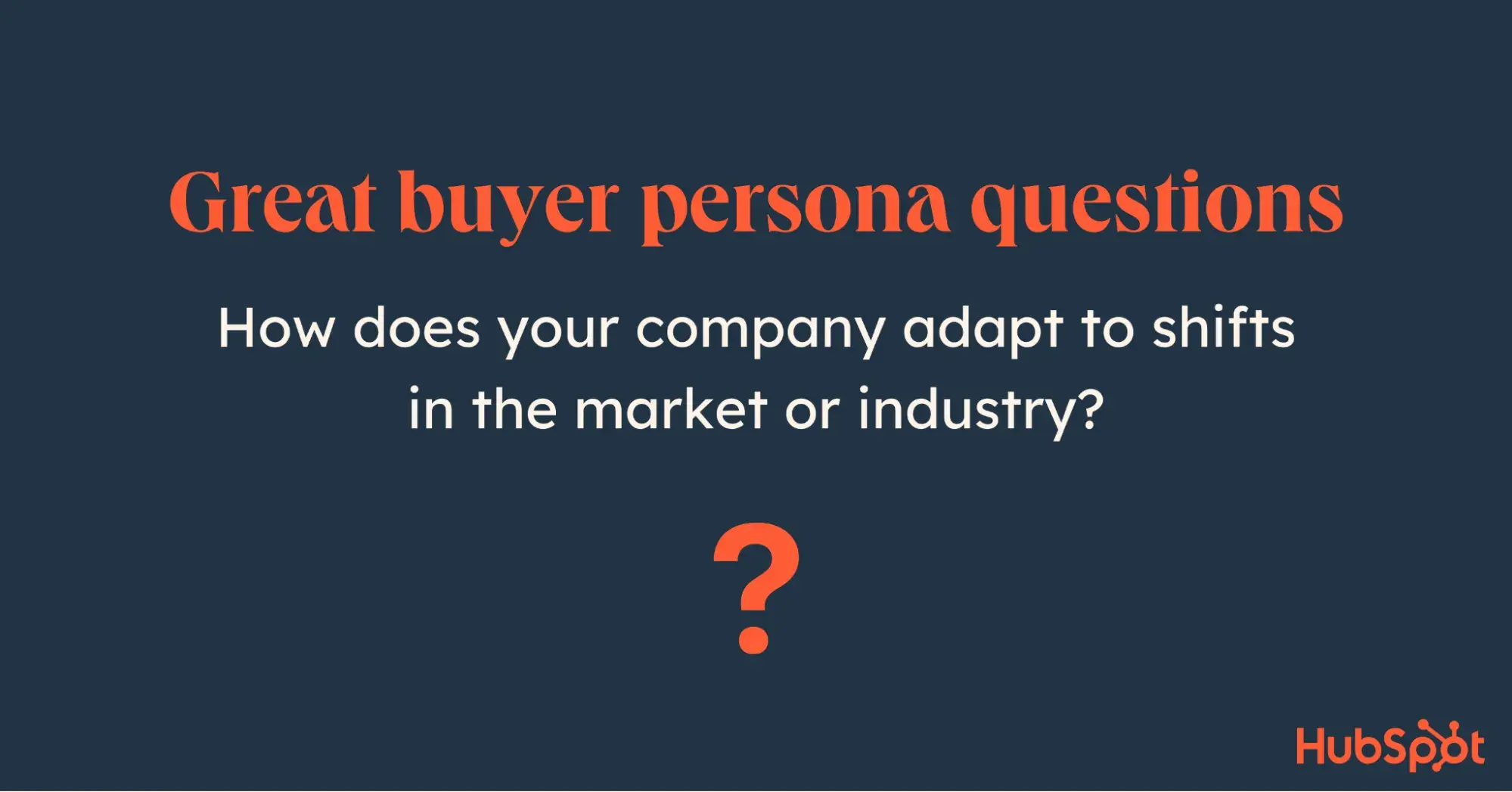
Pick the right buyer persona interview questions.
Building buyer personas can help you create a customer-first marketing strategy and tailor your messaging to their goals and aspirations. I use buyer personas to prepare the groundwork for every campaign I launch.
After creating dozens of buyer persona surveys and interviews, I’ve handpicked these buyer persona interview questions. Use these to survey a small sample of your target audience and collect crucial data to define your buyer personas.
Editor's note: This post was originally published in October 2015 and has been updated for comprehensiveness.

Buyer Persona Templates
Organize your audience segments and make your marketing stronger.
- Learn about personas.
- Conduct persona research.
- Create targetted content.
- Build your own personas.
Download Free
All fields are required.

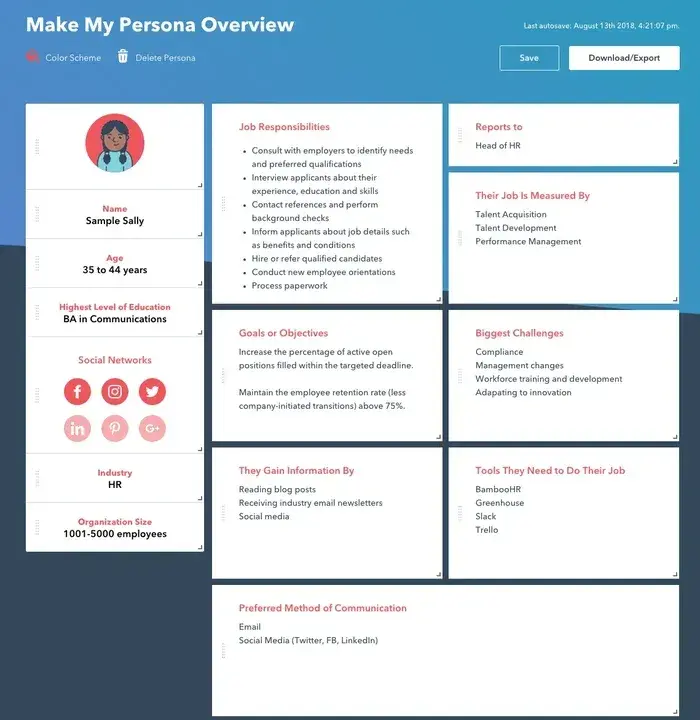

![How to Create Detailed Buyer Personas for Your Business [+ Free Persona Template]](https://www.hubspot.com/hubfs/buyer-persona-research_1.webp)


![The Definition of a Buyer Persona [in Under 100 Words]](https://www.hubspot.com/hubfs/a%20woman%20buyer%20persona.jpg)





